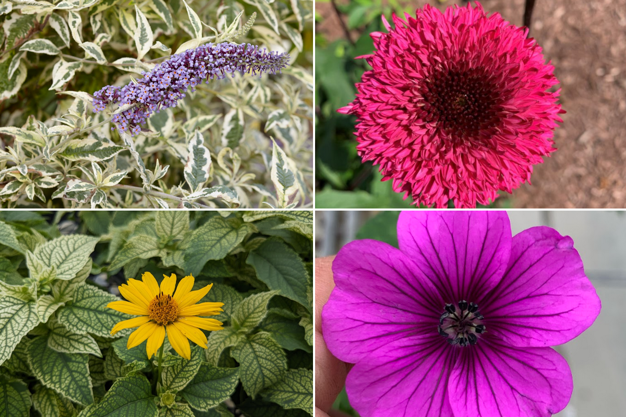"We are very much a breeder representation company," states Justin Wisniewski, General Manager at Must Have Perennials. In this article, he and Kris Smith, Marketing Manager, share what entails representing a global breeders' network. They also give some insight into the way in which certain trends and developments impact the breeding domain. Moreover, they announce the introduction of new varieties, and what's more; a new brand.
Upholding a legacy
Must Have Perennials' roots lie in the former company Blooms of Bressingham, a breeder representation agency that introduced perennials for over 25 years. In the early 2000s, this company was acquired by Aris Horticulture, which led to the foundation of Must Have Perennials.
Justin comments on Must Have Perennials main activities and the way the company has evolved: "We continue the traditions that began with Blooms of Bressingham. We don't do any active breeding ourselves, we are servicing our networks of breeders, focusing on perennials. To do so, we set up supply chains of growers and licensees, and bring varieties through rigorous plant trials so that they can be ready for the commercial market. Moreover, we work with Royalty Administration International to collect royalties and take actions to prevent illegal propagation, all in an effort to ensure that breeders get what they deserve.
Over the years Must Have Perennials has grown and now has a global reach thanks to our partners in breeding, tissue culture, and rooting stations. Some of our major partners include, AllPlant, Walter Blom Plants, R&S Tissue Culture, Denis Plants, Vitroflora, Alkemade, and Darwin Perennials, just to name a few. The majority of our business is in Europe, even though we are based in the US. Recently, we have also expanded beyond perennials, however perennials remain our core strength."

Justin Wisniewski with Al Mueller of Emerald Coast Growers
Introducing new varieties
As said, pulling plants through garden performance and growing trials is one of the main tasks of the Must Have Perennials team. The Must Have Perennials varieties are being evaluated in the company's private gardens, in university trials, and botanical gardens. Justin highlights that the plants' performance in different climates is one important factor that is being evaluated during the trials. Justin says: "Hardy in the Netherlands is not the same as hardy in the US. To take those different climates in to account, we send our plants to all our partners for feedback concerning their performance. For instance, we send all our cold varieties to Minnesota."
Previously the company has introduced varieties such as the Buddleja 'Butterfly Gold', Geranium 'Hexum Velvet', Heliopsis 'Oriole Variegata' and Echinacea 'Lovely Lolly'.
Also this year they plan to introduce new varieties, Justin says: "Now is a very exciting time for us and our partners as we bring out new varieties. Some of the new varieties that we will be introducing in 2025 are the Aconitum arendsii 'Pershore Abbey', Lavandula Purple Rain Adventure, and Sedum Key of Heaven." Kris comments: "We think that the Purple Rain Adventure, a lavender, can become very popular, especially in hanging baskets. We are really keen to bring in something different."
 Clockwise: Buddleja 'Butterfly Gold', Echinacea 'Lovely Loly', Heliopsis 'Oriole Variegata', and Geranium 'Hexam Velvet'
Clockwise: Buddleja 'Butterfly Gold', Echinacea 'Lovely Loly', Heliopsis 'Oriole Variegata', and Geranium 'Hexam Velvet'
Responding to trends
Justin points out that Must Have Perennials aims to respond to the latest market trends and developments when introducing new varieties, saying: "One of the main market trends in Europe is the peat-free trend. We make sure that our varieties work in the growing media the market is moving to. We think that this trend will become big in the US too. Interestingly we see that in Europe people are more interested in vernalization, and stable root systems than in the US.
We also look at consumer trends. For instance, in Europe containers and mixed-plantings are really popular because houses in Europe tend to be smaller than US ones. We are very aware of this. An example of this is our Helleborus Rockies series. For this series, we worked with a container to meet this European trend. We wanted to make sure that this series could be diversely used. Not everything works everywhere, and we want the end-user to feel confident and successful with their plants wherever they are in the world."

An impression of the Helleborus Rockies Series
"One big challenge we have to take into account when introducing new varieties is climate change," Justin adds. "We see a growing demand for plants with a high drought and heat tolerance, so the new varieties of our breeders really need to be tough. In this respect, we also look at the adaptability and uniqueness of plants. Moreover, we noticed an increasing concern for native plants. We take that into account and try to find a healthy middle ground to meet these needs, typically through the introduction of hybridized cultivars."
Kris brings to the foreground that consumers' perception of plants is changing too, saying: "Plants are increasingly seen as design elements that can be integrated in space, such as walls and roofs. This development will lead to more interesting plants. In addition, consumers have more attention for the way in which plants can have a positive impact on psychological well-being, and on bringing individuals and communities together. These developments are something that we really want to explore more, we're excited to see what's coming up in the years ahead."
What's next?
In order to keep up-to-date and to maintain relationships with their partners, Must Have Perennials is participating at various trade shows such as Cultivate in July. Justin explains why he finds these events valuable: "For us, it's about continuing and maintaining relationships with our partners. I will also present two Cultivate Sessions: 'Insights for Northeastern US Perennial Growers' and 'Review of Perennial Trials Across the US'. The latter will be concerned with climate change to a degree. Maybe 60% of the US changed zones this year, it means we can grow varieties that normally would have died in the winter. For some growers it's exciting that they can grow a new type of varieties, but it's scary too. In our line of work, these challenges provide us with valuable information about adverse conditions and how plants behave.
Through events such as trade shows, we also want to make sure that our breeders, which mostly are small, independent companies, have a good distribution. Namely, those companies are challenged by the ongoing rise of big breeding companies who can provide faster and larger volumes. As the methodology of genetic engineering becomes more widespread in the US, we want to support those smaller breeders who still are involved in conventional breeding."
At Cultivate, Must Have Perennials will give a sneak-peak into their new brand. Kris comments: "With growing relationships with breeders, growers and distributors, as well as increased interest in new plants, we are getting close to launching a new brand later this year. This brand will be focused on education and involves 70 new varieties."
For more information:
Must Have Perennials
www.musthaveperennials.com
